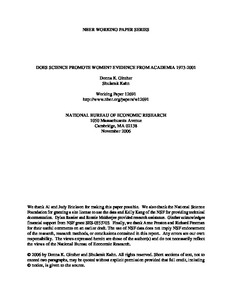Does science promote women? Evidence from academia 1973-2001
"Many studies have shown that women are under-represented in tenured ranks in the sciences. We evaluate whether gender differences in the likelihood of obtaining a tenure track job, promotion to tenure, and promotion to full professor explain these facts using the 1973-2001 Survey of Doctorat...
| Main Authors: | , , |
|---|---|
| Institution: | ETUI-European Trade Union Institute |
| Format: | TEXT |
| Language: | English |
| Published: |
Cambridge, MA
2006
NBER |
| Subjects: | |
| Online Access: | https://www.labourline.org/KENTIKA-19126090124919442729-Does-science-promote-women?-ev.htm |
| Summary: | "Many studies have shown that women are under-represented in tenured ranks in the sciences. We
evaluate whether gender differences in the likelihood of obtaining a tenure track job, promotion to
tenure, and promotion to full professor explain these facts using the 1973-2001 Survey of Doctorate
Recipients. We find that women are less likely to take tenure track positions in science, but the gender
gap is entirely explained by fertility decisions. We find that in science overall, there is no gender difference
in promotion to tenure or full professor after controlling for demographic, family, employer and productivity
covariates and that in many cases, there is no gender difference in promotion to tenure or full professor
even without controlling for covariates. However, family characteristics have different impacts on
women's and men's promotion probabilities. Single women do better at each stage than single men,
although this might be due to selection. Children make it less likely that women in science will advance
up the academic job ladder beyond their early post-doctorate years, while both marriage and children
increase men's likelihood of advancing." |
|---|---|
| Physical Description: | 41 p. Digital |

